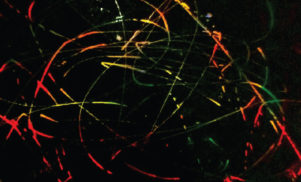Available on: Ninja Tune
When fashion turns to face one way, Steve Spacek weaves the other. In 2015, chuck a stone and you’ll strike a new producer who’s busy building up his hardware, or “getting really deep into modular synthesis”. In the past, Spacek has aligned himself with some of music’s most forward-thinking producers – working with J Dilla on Spaceshift’s lead single ‘Dollar’, or contributing vocals to When Machines Exceed Human Intelligence, the 2008 album by Mark Pritchard’s Harmonic 313. But Modern Streets, Spacek’s first album in eight years – and his first under the fairly self-explanatory pseudonym of Beat Spacek – takes at what first glance appears to be a contrary path. Largely composed using iPad and iPhone technology, it is, depending on how you look at things, either a consciously lo-fi, strip-it-down move, or an acknowledgement that these days, powerful technology can often be found in the smallest and most humble of packages.
Whichever, Modern Streets works. Around the time of 2001’s Curvatia, Spacek was being compared to D’Angelo, and vocally speaking, that’s not a comparison that feels in any way absurd: his voice remains silky, mellifluous, perpetually poised somewhere between melancholy and mischief. But Modern Streets feels some way removed from Black Messiah’s humid, organic take on Sly-style soul and funk. Tracks like ‘I Wanna Know’ and ‘Inflight Wave’ feel spontaneous and dynamically straightforward, their beats angled to a trajectory and left to skitter and splutter with little sense of subsequent redirection or interruption. Despite a mastering job from Island engineer John Dent, it can feel stiff and synthetic. But there’s the sense that Modern Streets is arranged this way to bring out a contrast, the basic technology creating a landscape of flat surfaces and smooth platforms over which Spacek’s voice leaps an elegant parkour.
Sometimes, the technology is placed right there at the forefront. ‘I Wanna Know’ tethers Spacek’s high, beseeching falsetto to a drum’n’bass tempo and a thick and dirty bottom line that wavers around so you can picture a finger sliding up and down a flatscreen pane. The basic workstation seldom feels particularly restrictive, though, and for all its undoubted simplicity, Modern Streets still pulls off some uncanny genre experiments. ‘Stand Firm’, for instance, has the amiable lope and hazy chorusing of some ‘70s ska or rocksteady cut, while ‘Tonight’ neatly segues between a sample of some drum-heavy African highlife record and skittering digital beats with a limber ease. Just add Spacek’s loverman falsetto and the result is an easy album highlight.
Here and there, there are echoes of a theme – a drawing of lines between the south London in which Spacek grew up, and the modern-day reality. The title track is a horrifying vignette of Friday night aggro, street drinkers and accidental death that in its stripped percussion and tremulous delivery, improbably recalls ‘70s synth-punks Suicide. The reggae-tinged ‘There Is A Love’ is a pledge of solidarity in the face of poverty and inequality (“They want it all/Even though they’re reeking of wealth… they think they have the rights to your heaven”). And while the dotty electro-funk of late album cut ‘Back To School’ is hardly Modern Streets’ most essential moment, its elder wisdom about the importance of getting an “edu-ma-cation” might raise a smile.
More often than not, though, we find Spacek falling back on the language of love. Whether spinning out whooshing Afrofuturist airline fantasies on ‘Infight Wave’ (“In the future/The love’s gonna fuel the airwaves”), or opting for simple and heartfelt sentiments on ‘I Want You’, it feels fresh and invigorated. Yes, it’s the sound of a stripped-down Steve Spacek – but Modern Streets reminds you of the freedom you can feel when travelling light.





























